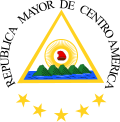Central Exoña
Federal Republic of Central Exoña República Federal de Exoña Central
4 other names
| |||||||||
|---|---|---|---|---|---|---|---|---|---|
| Motto: Dios, Unión, Libertad God, Union, Liberty | |||||||||
| Anthem: National Anthem of Central Exoña | |||||||||
| Location | Central Eigonia | ||||||||
| Capital and largest city | Chalatenango | ||||||||
| Official languages | Ilobascan | ||||||||
| Recognised national languages | |||||||||
| Ethnic groups |
| ||||||||
| Religion | Catholicism | ||||||||
| Demonym(s) | Central Exonian | ||||||||
| Government | Federal presidential republic under an authoritarian dictatorship | ||||||||
| Armando Castañeda Villanueva | |||||||||
| Domingo Flores Buenavista | |||||||||
| Legislature | National Legislative Congress | ||||||||
| Senate | |||||||||
| Assembly of Deputies | |||||||||
| Population | |||||||||
• 2023 estimate | 55,623,855 | ||||||||
| GDP (nominal) | estimate | ||||||||
• Total | 231.9 billion | ||||||||
| Currency | Central Exonian escudo (₡) (EEC) | ||||||||
| Date format | dd/mm/yyyy | ||||||||
| Driving side | right | ||||||||
| Calling code | +5 | ||||||||
| Internet TLD | .ec | ||||||||
Central Exoña, officially the Federal Republic of Central Exoña (Ilobascan: República Federal de Exoña Central), sometimes referred to as the Sixth Republic of Central Exoña, and sometimes rendered as Central Eigonia, is a country located in Central Eigonia, bordered by Dargentia to the south. Central Exoña's largest and capital city is Chalatenango; other major urban areas include La Libertad, San Vicente, Santa Ana, and Soyapango. As of 2023, Central Exoña has a population of 55.6 million.
Central Exoña is a presidential republic; elections are held every five years to elect the country's president. Additionally, legislative elections are held to elect members to the National Legislative Congress, the country's bicameral legislature—every three years for the upper house and every two years for the lower house.
Etymology
History
Kingdom
until 1814
Revolutionary republic
On 15 September 1814, King Alfonso III was overthrown by a group of military officers, ending the Central Exonian kingdom. The military officers proclaimed the establishment of a revolutionary republic and named General Pedro Murillo Castillo as the country's first president. Murillo Castillo was assassinated on 5 March 1815 by mutinous soldiers commanded by Colonel Francisco Guevara Ussía, who also attempted to assassinate José González Gómez, the country's vice president. González Gómez proclaimed himself president and ordered the arrest and execution of all those involved in Murillo Castillo's assassination.
Prior to his assassination, Murillo Castillo promised to hold democratic elections in August 1815 to elect the country's president; the soldiers who assassinated him opposed democratization and wished to restore the monarchy. After González Gómez assumed office, he stated that he would still hold elections in August 1815, but announced in May 1815 that the elections would be postponed until May 1816 in order to establish an electoral body to ensure electoral integrity. In January 1816, the election was again postponed until August 1816, stating that the country's president should assume office on 15 September to commemorate the republic's establishment.
In June 1816, González Gómez officially announced the election's cancelation, claiming that a revolution was being conspired against the republic. He declared martial law and postponed election indefinitely. On 27 February 1818, González Gómez was assassinated by Martín Valdéz Castro, a republican revolutionary who opposed González Gómez's de facto dictatorship. Shortly after the assassination, the leaders of the country's two political parties—Carlos Infantes Álvarez of the Conservative Party (PC) and José Ramírez Delgado of the Liberal Party (PL)—both proclaimed themselves as the country's provisional president.
First civil war
1818–1821
Centralist republic
1821–1845
Federal republic
1845–1875
Military dictatorship
1875–1916
Second civil war
1916–1921
- Dictatorship loyalists (until 1917)
- Republicans
- Communists
Dominant party republic
1921–1985
Modern era
since 1985
Geography
Government
Demographics
- 1820 1,550,000 +0.37%
- 1870 2,547,000 +1.00%
- 1904 5,175,463 +2.11%
- 1911 5,972,757 +2.07%
- 1921 6,153,000 +1.50%
- 1931 6,927,403 +1.49%
- 1946 9,587,863 +2.19%
- 1956 11,415,925 +1.76%
- 1960 13,683,162 +4.63%
- 1965 15,384,557 +2.37%
- 1970 17,396,367 +2.49%
- 1980 22,502,502 +2.61%
- 1990 29,077,143 +2.60%
- 1995 36,793,490 +2.38%
- 2001 41,426,810 +2.40%
- 2007 44,819,777 +1.32%
- 2011 48,502,063 +1.32%
- 2016 51,770,560 +1.64%
- 2023 55,623,855 +1.46%


